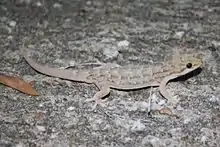Oriental leaf-toed gecko
The Oriental leaf-toed gecko (Hemidactylus bowringii), also known as Bowring's gecko, Sikkimese dark-spotted gecko, or Asian smooth gecko, is a species of gecko endemic to East Asia.
| Oriental leaf-toed gecko | |
|---|---|
 | |
| Scientific classification | |
| Kingdom: | Animalia |
| Phylum: | Chordata |
| Class: | Reptilia |
| Order: | Squamata |
| Family: | Gekkonidae |
| Genus: | Hemidactylus |
| Species: | H. bowringii |
| Binomial name | |
| Hemidactylus bowringii (Gray, 1845) | |
| Synonyms[1] | |
| |
Etymology
The specific name, bowringii, is in honor of either John Charles Bowring, who was a British amateur naturalist and businessman in Hong Kong, or his father John Bowring, who was a British diplomat and a governor of Hong Kong.[2]
Description
Snout longer than the distance between the eye and the ear-opening, 1.4 times the diameter of the orbit; forehead slightly concave; ear-opening small, roundish. Body and limbs moderate; a slight fold of the skin along the flank. Digits free, moderately dilated, inner well developed; infradigital lamellae obliquely curved, 5 under the thumb, 7 or 8 under the fourth finger, 5 or 6 under the first toe, and 9 or 10 under the fourth toe. Upper surfaces covered with uniform small granular scales, largest on the snout, smallest on the occiput. Rostral four-sided, twice as broad as deep, with median cleft above; nostril pierced between the rostral, the first labial, and three or four nasals; 9 to 11 upper and 7 or 8 lower labials; mental large, triangular, followed by a pair of chin-shields; an outer pair of much smaller chin-shields. Abdominal scales moderate, cycloid, imbricate. Male with a series of preanal pores, interrupted mesially, composed of 13 pores on each side. Tail depressed, rounded, oval in section, covered above with uniform small scales, beneath with a median series of transversely dilated plates. Light brown above, with darker spots, having sometimes a tendency to form four longitudinal bands on the back; frequently small whitish spots on the body and limbs; a dark streak passing through the eye; tail above with small chevron-shaped markings; lower surfaces whitish.
From snout to vent 1.3 in (3.3 cm); tail 2 in (5.1 cm). [3]
Geographic range
East Asia, including southern China, Taiwan, Hong Kong, Vietnam (Ha Noi; Hon Thom Island ), and Japan (Ryukyu Islands = Okinawa).
References
- "Hemidactylus bowringii ". The Reptile Database. www.reptile-database.org.
- Beolens, Bo; Watkins, Michael; Grayson, Michael (2011). The Eponym Dictionary of Reptiles. Baltimore: Johns Hopkins University Press. xiii + 296 pp. ISBN 978-1-4214-0135-5. (Hemidactylus bowringii, p. 36).
- Boulenger GA (1890). The Fauna of British India, Including Ceylon and Burma. Reptilia and Batrachia. London: Secretary of State for India in Council. (Taylor and Francis, printers). xviii + 541 pp. (Hemidactylus bowringii, p. 93).
Further reading
- Boulenger GA (1885). Catalogue of the Lizards in the British Museum (Natural History). Second Edition. Volume I. Geckonidæ ... London: Trustees of the British Museum (Natural History). (Taylor and Francis, printers). xii + 436 pp. + Plates I-XXXII. (Hemidactylus bowringii, new combination, p. 139 + Plate XII, figure 2).
- Gray JE (1845). Catalogue of the Specimens of Lizards in the Collection of the British Museum. London: Trustees of the British Museum. (Edward Newman, printer). xxviii + 289 pp. (Doryura bowringii, new species, p. 156).
- Liang, Yun-Sheng; Wang, Chin-Shiang (1973). "Comparative study of osteology on the House Geckos, Hemidactylus bowringii (Gray) and Hemidactylus frenatus Dumeril & Bibron, from Taiwan". Fu Jen Studies (7): 63-123.